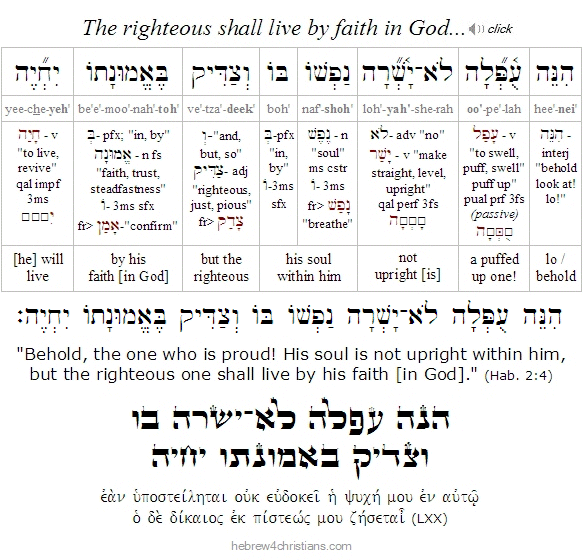|
Faith is the essence of all true Torah from heaven, since apart from it no one can possibly draw near to God (Heb. 11:6). Indeed the very purpose of creation is to receive the love of the Creator, and consequently whoever disregards or suppresses this truth necessarily fails to apprehend the essential reason for his or her existence. The meaning or message of reality itself is revealed in God's love (1 John 4:8).
Since love for God must be tested to ensure its integrity, it is noteworthy that Jacob (and his sons) explicitly followed God's guidance before immigrating to Egypt, which subsequently led to their oppression by the "new king" of Egypt (see Gen. 46:1-7). Despite the betrayal often afforded by appearances, however, consider how great is the merit of faith, since Israel was redeemed from Egypt only as a reward for trusting in promise of their deliverance, as it is written, "and the people believed" (וַיַּאֲמֵן הָעָם) ... and bowed their heads and worshiped" (Exod. 4:31). Salvation (יְשׁוּעָה) has always been based on faith in God's love and grace...
Like the precious promises of a bridegroom to his beloved, the words of Torah are to be kept in the "midst of the heart" where they serve as a source of life (Prov. 4:21-22). Therefore the prophet Jeremiah sees the land besieged by foreigners and yet signs the deed to redeem the land in the days ahead. Though he was to be evicted from the land and subjugated by the Babylonians, Jeremiah never lost faith in God's promise (Jer. 32:11-14).
The Talmud (Makkot 23b-24a) says, "Moses gave Israel 613 commandments, David reduced them to eleven (Psalm 15), Isaiah to six (Isaiah 33:15-16), Micah to three (Micah 6:8), Isaiah reduced them again to two (Isaiah 56:1); but it was Habakkuk (חֲבַקּוּק) who gave the one essential commandment: ve'tzaddik be'emunato yeech'yeh (וְצַדִּיק בֶּאֱמוּנָתוֹ יִחְיֶה), literally, "the righteous one, by his trust, shall find life" (Hab. 2:4).
הִנֵּה עֻפְּלָה לא־יָשְׁרָה נַפְשׁוֹ בּוֹ
וְצַדִּיק בֶּאֱמוּנָתוֹ יִחְיֶה
hee·nei · oo·pe·lah · lo-ya·she·rah · naf·sho · bo
ve·tza·deek · be·e·moo·na·to · yee·che·yeh

"Behold, his soul is puffed up; it is not upright within him,
but the righteous shall find life by means of his trust."
(Hab. 2:4)
Hebrew Study Card

Hebrew Lesson:
Habakkuk 2:4 Hebrew reading lesson (click):
In the New Testament, the apostle Paul likewise distilled the various commandments of the Torah to this primordial principle that the righteous one shall live by his trust (see Rom. 1:17, Gal. 3:11, and Heb. 10:38). Spiritual life is the blessing of faith, since apart from faith we are spiritually dead and "powerless (ἀδύνατος) to please God" (Heb. 11:6). As King David said, "The LORD is near to all who call upon Him - to all who call upon Him in the truth" (Psalm 145:18). God is near to the honest soul who confesses the truth about his need, just as God distances himself from the proud and puffed up soul.... This is the "like-for-like" nature of faith: "according to your faith let it be it done for you" (Matt. 9:29). This works the other way around, too. Genuine faith implies "walking in God's ways" (Deut. 28:9). Just as God is the Merciful One, so you practice mercy; just as He is the Gracious One, so you perform acts of grace; just as God is the Holy One, so should you be holy, and so on. We must be "wholehearted" before the LORD (Deut. 18:13; Matt. 5:48) - that is, the inner life must be in agreement with outer life, free of hypocrisy or dissimulation. As the prophet Jeremiah attested: "The LORD (יהוה) is the God of truth (אֱלהִים אֱמֶת); He is God of Life (אֱלהִים חַיִּים) and the King of eternity (מלֶךְ עוֹלָם)" - Jer. 10:10 , cp. John 14:6). Therefore we are called to trust in the LORD and "feed upon" His faithfulness:
בְּטַח בַּיהוָה וַעֲשֵׂה־טוֹב
שְׁכָן־אֶרֶץ וּרְעֵה אֱמוּנָה
be·tach · ba-donai · va·a·seh-tov
she·khon-e'·retz · oor·eh · e·moo·nah

"Trust in the LORD, and do good;
dwell in the land and feed on faithfulness" (Psalm 37:3)

Hebrew Lesson:
Psalm 37:3 Hebrew reading lesson (click):
Consider again that Israel was redeemed from Egypt only as a reward for trusting in promise of their deliverance, as it is written, "and the people believed" (וַיַּאֲמֵן הָעָם) ... and bowed their heads and worshiped" (Exod. 4:31). In the future, too, Israel will be redeemed as a reward of their faith, since it is written of Israel: "Open the gates, that the righteous nation that keeps faith may enter in" (Isa. 26:2).
The Christian faith can never be separated from theological Zionism, since impugning God's faithfulness and truth to Israel is to impugn His faithfulness and truth to the church... No, God has a sure plan for Israel that will never, ever fail. Speaking of the End of Days, the prophet declares, "Israel has been saved by the LORD with an everlasting salvation; you shall not be put to shame nor disgraced forever in all the ages to come" (Isa. 45:17).
יִשְׂרָאֵל נוֹשַׁע בַּיהוָה תְּשׁוּעַת עוֹלָמִים
לא־תֵבשׁוּ וְלא־תִכָּלְמוּ עַד־עוֹלְמֵי עַד
yees·ra·el · no·sha' · badonai · te·shoo·at · oh·la·meem
lo · tei·voh'·shoo · ve·lo-tee·ka·le·moo · ahd · ol·mei · ahd

"Israel has been saved by the LORD with an everlasting salvation;
you shall not be put to shame nor disgraced forever in all the ages to come."
(Isa. 45:17)
The message of God's redemption of Israel was prophetic of His salvation for the entire world... As I have said repeatedly before, what you believe about Israel and the Jewish people will affect all other areas your Christian theology.
|






